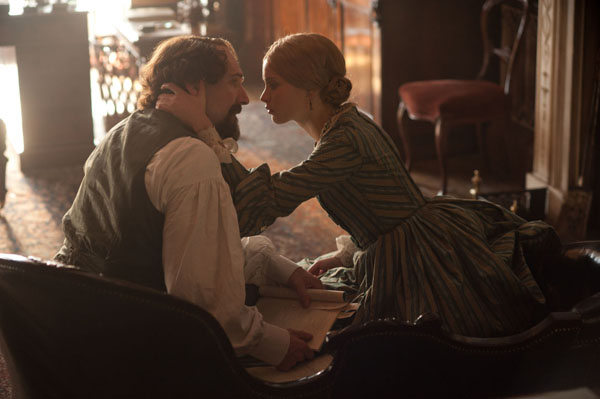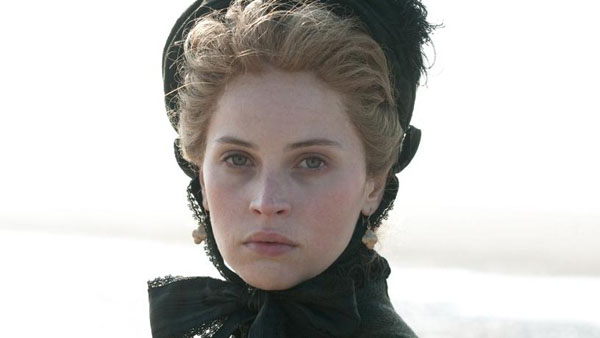“Ralph Fiennes whipped up some great blood and thunder in his directing debut, Coriolanus,” begins Tim Robey in the Telegraph, “despite a minor blind spot in the area of his own performance: ‘Memo to self: turn it down a notch?’ may have been an instruction he was just too busy to issue. His second film, The Invisible Woman…, is a considerably more patient undertaking, and all the better for it. Fluid, handsome and confidently contained, it benefits from the actor-manager air of Fiennes’s presence as Charles Dickens, which is bustling and authoritative but frequently offstage. The film’s main character is the altogether sadder Nelly Ternan [Felicity Jones], the young, aspiring actress whose affair with Dickens in his later years Claire Tomalin handled in her book of the same name.”
“As in The Iron Lady, the screenwriter Abi Morgan makes much use of flashbacks and once again they prove to be something of an Achilles heel, ensuring a long-winded introduction of two large sets of characters in different towns and different eras, most of whom end up in the chorus,” writes Kaleem Aftab in the Independent. “In Margate, 1885, the school of Nelly’s headmaster husband (Tom Burke) is putting on a production of No Thoroughfare: A Drama: In Five Acts. The action then flashes back to a Manchester theater where an 18-year-old Ellen [as Nelly was first known] arrives with her family of actresses—mother (Kristin Scott Thomas) and older sister (Amanda Hale)—to perform in Dickens’ adaptation of his friend Wilkie Collins’s (Tom Hollander) play The Frozen Deep. The one character who remains peripheral during all of this is spouse Catherine Dickens, who ends up stealing the picture thanks to a wonderful performance from Getting On star Joanna Scanlan.”
“Morgan’s secret weapon, deployed with nice timing, is Nelly’s own reticence,” argues the Guardian‘s Catherine Shoard. “And the unlikely power structure in their relationship is what makes The Invisible Woman affecting. Fiennes’s Dickens is no silver fox whisking off a hot groupie; his pursuit is so tentative and shambling it’s almost embarrassing. A scene in which he yearningly rests his whiskers on Nelly’s cheek is slightly sexy, yes, and also borderline repellant.”
Variety‘s Scott Foundas: “In a role that seems an invitation to puffed-up flourishes, Fiennes very skillfully keeps Dickens human-scale, clearly a man who craves the adoration of his public (and comely young women in particular), undeniably egoistic, but also flawed and vulnerable in unexpected ways, yearning for love but limited in the compromises he’s willing to make for it. Jones, meanwhile, wears her face in the taut pose of a serious woman at a time when seriousness was not deemed a feminine virtue, letting her guard down only by centimeters as she falls deeper under Dickens’ spell. It is a performance of such fierce emotional control that, on the two occasions when the actress cracks something resembling a half-smile, it is as if a tremor has passed underneath the cinema.”
“Period biographical dramas don’t come much better,” writes the Hollywood Reporter‘s Todd McCarthy. “Fiennes is on top of every aspect of this film, which benefits from agile and eye-catching cinematography by Robert Hardy and production design by Maria Djurkovic and costumes by Michael O’Connor that richly evoke the era. Ilan Eshkeri’s score is another plus.”
More from Mark Adams (Screen), Gregory Ellwood (HitFix, C+), Eric Kohn (Indiewire, B), Angelo Meredda (Cinema Scope), and Chris Willman (Playlist, B-).
Having premiered at Telluride, The Invisible Woman is a Special Presentation in Toronto. Then, it’s on to New York.
Updates, 9/11: “The Invisible Woman presents Dickens as both a kind and gentle man and the Victorian equivalent of a rock star; he loved Nelly deeply but he may have loved his fame the more.” The Boston Globe‘s Ty Burr: “More than anything else, The Invisible Woman feels as inward as its director-star himself, moving to Fiennes’ private rhythms rather than the imperatives of a commercial marketplace. This is hardly a bad thing but, rather, a way to say that the movie’s un-bodied passion may discombobulate (or worse, bore) audiences hoping for more of a bodice-buster.”
“From behind the camera,” writes William Goss at Film.com, “Fiennes often emphasizes slow pushes and pulls in keeping with the subdued mood, occasionally lining up particularly painterly shots such as the reveal of a seemingly frozen crowd awaiting the end of a horse race. With the help of a smartly positioned coda, the film is bookended by a pair of stage performances and, in turn, makes a subtle case that these characters never really stopped putting on a show.”
“As with Coriolanus, Fiennes ably directs the rest of the cast but is unsure of how to capture his own performance,” adds Leora Heilbronn at Ioncinema.
2013 Indexes: Venice and Toronto. For news and tips throughout the day every day, follow @KeyframeDaily on Twitter and/or the RSS feed. Get Keyframe Daily in your inbox by signing in at fandor.com/daily.





